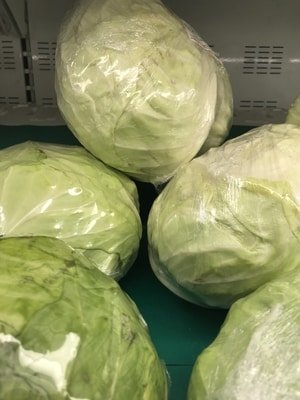
A relative of broccoli, Brussel sprouts, cauliflower, and kale; cabbage is a cruciferous vegetable that is Keto-friendly. This veggie is so versatile, it can be used in so many delicious Keto recipes, whether you’re cooking up cabbage rolls, sautéed cabbage noodles or cabbage soup, you can rest assured – this vegetable is not only low in carbs, it is a nutritional superstar! You can enjoy a serving of cabbage while on any low carb diet and remain well within your daily carb limit.
If you’re having trouble giving up pasta while following the Keto diet, why not revamp your favorite pasta recipes with cabbage noodles? Just top cabbage noodles with low sugar pasta sauce and Parmesan cheese to instantly turn any pasta dish into a low carb sensation.
How Many Carbs are in Cabbage?
There are 4 grams of carbs in a full cup of green shredded cabbage. One large leaf contains only 1.9 grams of carbs.
Shredded Red Cabbage contains 5 grams of carbs per cup.
How Many Calories are in Cabbage?
One full cup of shredded green cabbage contains only 17 calories. The same amount of red cabbage contains about 22 calories.
One large leaf contains only 8 calories.
Nutrition Facts
| Serving Size: 1 cup of shredded cabbage (70 g) | |
| Calories 17 | |
| Total Fat 0.1 grams | 0% |
| Saturated fat 0 grams | 0% |
| Polyunsaturated fat 0 grams | |
| Monounsaturated fat 0 grams | |
| Cholesterol 0 milligrams | 0% |
| Sodium 12.6 milligrams | 0% |
| Potassium 119 milligrams | 3% |
| Total Carbohydrate 4.1 grams | 1% |
| Dietary fiber 1.8 grams | 7% |
| Sugar 2.2 grams | |
| Protein 0.9 grams | 1% |
| Vitamin A | 1% | Vitamin C | 42% |
| Calcium | 2% | Iron | 1% |
| Vitamin D | 0% | Vitamin B-6 | 5% |
| Cobalamin | 0% | Magnesium | 2% |
Types of Cabbage
- Cannonball Cabbage – also known as green cabbage. (Most of us are familiar with this variety of cabbage.)
- Bok Choy
- Chinese Cabbage
- Celery Cabbage
- Choy Sum
- Red Cabbage
- Napa Cabbage
- Savoy Cabbage
- January King Cabbage
Side Effects
Cabbage is safe for most people in normal food amounts and taken in medicinal amounts. It can also be applied to the skin, although some individuals with sensitive skin have reported pain and burning sensations when applying cabbage to the skin. However, this side effect is uncommon.

Applying cabbage leaves to the skin is safe and effective for a short time as an anti-inflammatory. While breastfeeding, it can be applied to the breasts to relieve swelling and pain due from breast-feeding. The compresses can be used several times a day for a few days.
Breast-feeding and taking cabbage in medicinal amounts by mouth may be
unsafe. Nursing mothers should avoid
cabbage as there is evidence that nursing infants can develop colic if their
mothers eat cabbage, even if they only eat it occasionally.
Some people are allergic to vegetables from the Brassicaceae/Cruciferae family, which include
cabbage. Cabbage relatives from the
Brassicaceae/Cruciferae family, such as broccoli, Brussels sprout, and
cauliflower may also pose a problem for these individuals. If you have allergies to cruciferous
vegetables, check with your doctor before consuming cabbage.
People who have an under-active thyroid gland (hypothyroidism) should avoid cabbage as there is a concern that cabbage may make this condition worse.
If you have a scheduled surgery, you should avoid cabbage as it might affect blood glucose levels and could interfere with blood sugar control during and after surgical procedures. Avoid cabbage for approximately 2 weeks before any surgery.
Health Benefits of Cabbage
Cabbage is a nutritional powerhouse that boasts the following amazing health benefits:
- Cabbage is nutrient dense and is especially rich in Vitamin C and Vitamin K.
- It works as an anti-inflammatory.
- It Helps Improve Digestion.
- It helps keep your heart healthy.
- It may lower blood pressure.
- Cabbage could help lower cholesterol levels.
- It has anti-cancer properties.
- It protects from radiation therapy.
- Cabbage boosts the immune system.
- This vegetable helps prevent cataracts as it is a rich source of beta-carotene.
Uses
Did you know that cabbage leaves are also used as medicine? It’s a bit of a mystery just how the chemicals in cabbage work as medicine – but they do work!
Cabbage can be used to treat stomach conditions like intestinal ulcers, acid reflux and high cholesterol. This amazing vegetable can also help asthma sufferers and expectant mothers who experience morning sickness.
Cabbage also has the power to prevent weak bones in those who suffer from osteoporosis. Cabbage leaves also be applied joints to relieve pain and swelling from osteoarthritis.
It is an anti-cancer vegetable and helps fight off cancers of the lung, stomach and colon cancers. Cabbage positively affects the way estrogen is used in the body, which might also reduce the risk of breast cancer.
Cabbage can also help relieve breast swelling, pain and tenderness in nursing women. Just apply cabbage leaves and cabbage leaf extracts to the breasts. When applied to the breasts, cabbage leaves are as effective as most other remedies, if not more so. A cabbage leaf extract applied to the breast can also relieve swelling and tenderness of the breast.
Fiber in Cabbage
There are 1.8 grams of fiber a cup of shredded cabbage.
Sugar in Cabbage
There are only 2.2 grams of sugar in a full cup of shredded cabbage.
Weight-Loss Benefits of Cabbage

Cabbage is a low carb wonder and it’s low in calories, making it an excellent food for weight-loss. Since cabbage is packed with many vitamins and minerals, it is a healthy food that can assist you in shedding pounds. It is also full of water and fiber, to keep you hydrated and feeling satiated. The popular “cabbage soup diet” is often used for those looking to lose weight quickly. People who eat this soup reported amazing weight-loss results, so try it for yourself… I’ve included a great low carb cabbage soup recipe below.
Low Carb Cabbage Soup Recipe
Ingredients:
- 1 medium onion
- 1 medium carrot, diced
- 2 celery stalks, diced
- 3 cloves of garlic, pressed
- 1/3 cup fresh parsley
- 1 teaspoon celery salt
- 1/4 cabbage large, shredded
- 8 cups of water
- 2 chicken or veggie bouillon cubes
- Fresh ground black pepper (to taste)
- Beef bones (optional for those who prefer the added flavor of bone broth)
Instructions:
- Dice veggies and set aside.
- In a large pot, sauté the onion, carrot, celery, and minced garlic in olive oil until veggies are softened.
- Add the 8 cups of water and bouillon cubes to the bot and bring the broth to a boil.
- Add in the chopped cabbage, parsley, celery salt, and pepper to taste. If you are using beef bones, now is the time to add these in as well. Stir soup and then turn heat down to low.
- Simmer for 45 minutes and serve!
This recipe makes 8 servings.
Each bowl contains only 4 grams of net carbs.
Cabbage Benefits for Skin
Cabbage is rich in antioxidants, like vitamin C, anthocyanins, and sulphur. Antioxidants play a major role in skin health and can help combat the aging process. An underlying cause of wrinkles and various skin conditions is free radicals. The antioxidants in cabbage can repair the damage to your skin cells, keeping your skin smooth and youthful.
Cabbage Benefits for Hair
Cabbage is rich in sulphur, which is beneficial for strong hair and preventing hair loss. If you experience hair loss or weak hair, drink raw cabbage juice every day in the morning or use cabbage juice as a hair mask topically.
Cabbage juice promotes hair growth by nourishing the hair follicle at the root. The Vitamin E and silicon in cabbage can also help if you consume cabbage juice. Drinking this juice can help your hair grow longer and stronger.
